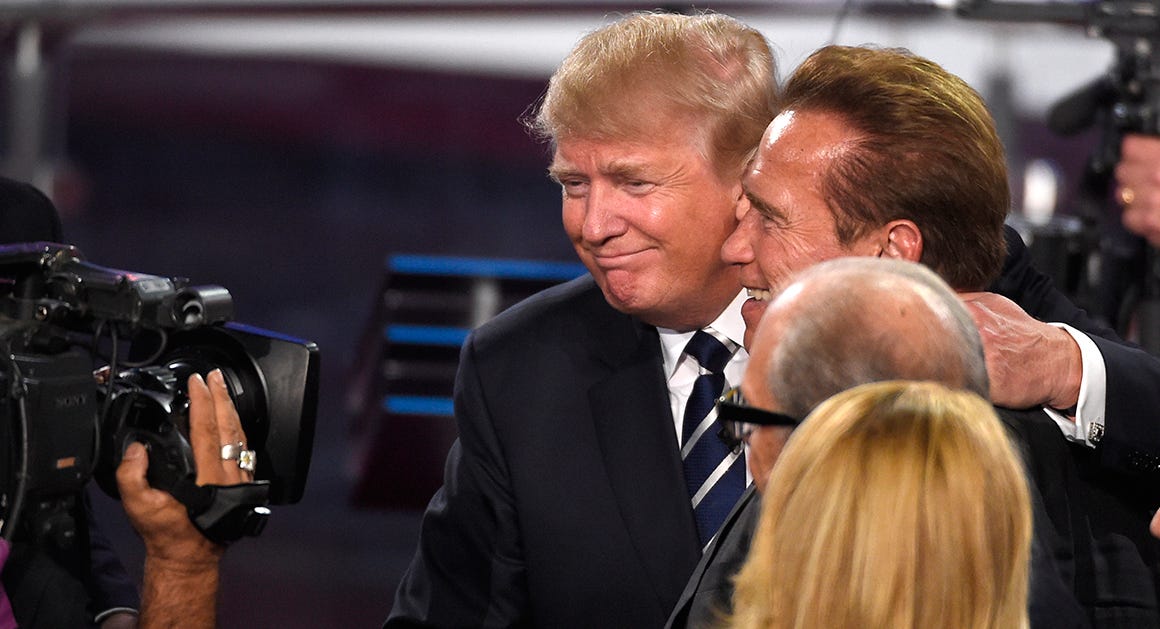Arnold Schwarzenegger, Donald Trump, and the quest for American greatness.
Loneliness and emptiness are the takeaways from Arnold, not Schwarzenegger’s upbeat calculated myth of himself.
I was surprised that I enjoyed the Netflix documentary mini-series, Arnold. I am not a Schwarzenegger fan. I’ve not seen one movie of the Austrian-born action hero. And I could care less about his faux machismo obsession with bodybuilding, a homoerotic Tom of Finland “sport,” which, at its highest level is centered––as Schwarzenegger admits––around steroid abuse. Though he was a moderate, independent-minded Republican, I never voted for Mr. Universe for California governor either. I did meet Schwarzenegger once standing at the back of St. Monica’s Catholic Church in Santa Monica, surrounded by his security detail. He seemed short.
But for strange and irresistible reasons, this sometimes-loveable narcissist makes for a compelling documentary subject. He reminds me of another sometimes-lovable narcissist, Donald J. Trump. In Manhattan, during the print magazine heyday of 1989-1993, when Spy and Monk were the “Talk of the Town,” I tacitly accepted the prevailing Democratic narrative about the Spy-dubbed “short-fingered vulgarian.” Trump was indeed a garish, tasteless braggart, whose buildings were cheesy, glitzy, and usually awful.
But then I heard snippets of Trump’s motivating ethos. And it dawned on me that he was successful for a reason. Not only because his dad Fred helped him get started in the New York real estate game––there are plenty of spoiled "losers" who squander parental aid––but because Trump, like Schwarzenegger, understood his audience and served them the aesthetic they craved. It helped that Trump’s personal aesthetic paralleled that of his moneyed condo buyers.
Arnold and The Donald play to the outsized aspirations of regular Americans. They are true populists and exceptional marketers of their brand, which is themselves. They rose to prominence in an era in which the personal was political, and the personal was immensely profitable. If he’d been allowed by the U.S. Constitution, "The Governator" could have become President. Instead, his counterpart in shameless self-promotion became our nation’s first larger-than-life tabloid POTUS.
While I think Arnold could have explored drug abuse in greater depth––just as the otherwise excellent Netflix mini-series "Quarterback" should have done in turn––I came away thinking that Arnold was honest in its way. When he signed on to the project, it’s doubtful that Schwarzenegger grasped how slyly observant director Lesley Chilcott would be in quietly revealing the emptiness of fame and fortune, as well as the peculiar sadness in Arnold’s life. Chilcott (An Inconvenient Truth Waiting for Superman) evokes a deep pathos through subtle shots of the protagonist alone, driving his absurdly giant machine toys, riding his too-short mountain bike to his Venice gym, smoking a stogie in his Jacuzzi, reflecting on the loss of his God-fearing mother. Loneliness, dissolution, and emptiness are the takeaways from Arnold, not Schwarzenegger’s giant upbeat myth of himself. Particularly sad is how Arnold blew up his marriage to elegant Kennedy clan scion Maria Shriver by screwing around with “the help.” It was dumb. He sees it. But it doesn’t take away from the tawdry tragedy.
Also sad is Schwarzenegger’s upbringing in the bucolic Austrian hamlet of Thal. It’s rare that a Hollywood production dares to explore what “coming home” meant for German and Austrian fathers who were drafted into fighting for Hitler’s fatherland. Hollywood prefers to treat them in dehumanizing caricature. But, over seventy-five years since the Holocaust, it’s refreshing to see an honest examination of these broken men and the alcoholic rage they inflicted on their families.
Schwarzenegger’s violently abused mother became an obsessive neat freak to gain some control over an uncontrollable home front. It’s no surprise that a young Arnold, seeking to prove his manhood to his raging humiliated police chief dad, would instinctively idolize the muscle-bound fantasy of the war’s glorious victors. And what better way to complete the circle than to become a preposterously huge caricature of Austrian-American bravado. We are, sadly, still amidst this cultural obsession with cartoonish superheroes, a sign of the late-stage decadence of a fading empire.
Yet, strangely, this craving for heroic arete is also a root instinct necessary for America’s renewal. Schwarzenegger and Trump have sought to jumpstart that renewal by fundamentally changing how the game is played: in business, entertainment, and politics. They are lonely change agents, hugely popular with the lonely crowd and hugely unpopular with an enervating, admonishing status quo. One is an immigrant from Austria to L.A. to Sun Valley. The other is an immigrant from Queens to Manhattan to Palm Beach. Their metaphorical and metaphysical journey is the same. And in following their trajectories, we see the direction in which America is heading.





How many people actually "get it", including myself! Trump, and Schwarzenegger, put me into pondering unorthodox thinking that works. They help by stirring the pot, to "be not afraid" (Pope John Paul II) to think outside the box. Just maybe the "deomocrats" will start thinking outside the box, the same for the "republicans". Dialogue not conflict will solve problems in peace - and it works.